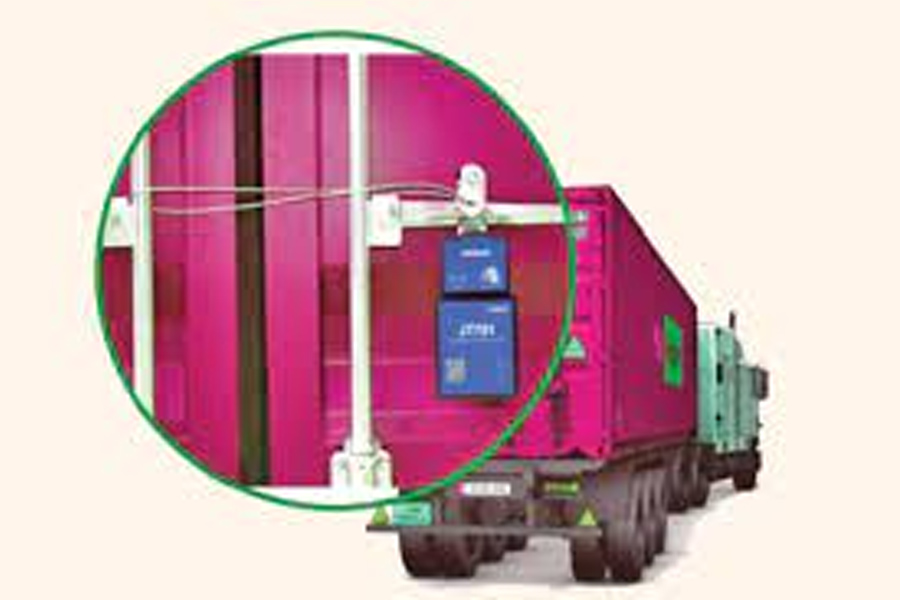NBR makes e-seal mandatory for transit goods
The use of electronic seals and locks would help minimise the risks of transit goods movement

Published :
Updated :

The National Board of Revenue (NBR) has issued a rule making an electronic lock and seal mandatory for transit and transshipment goods through Chattogram and Mongla ports to India.
Also, e-tracking would be conducted through the GPS system to ensure accuracy of imported goods' shipment from ports to destinations.
However, the previous RFID system for tracking of imported goods would also valid.
The NBR customs wing has scrapped the previous rules of e-seal and lock, Electronic Seal and Lock Service Rule-2018, following widespread controversy over appointment of contractors and other aspects.
In a gazette, the wing has issued the 'Electronic Seal and Lock Rules 2024' under the Customs Act 1969 effective from April 4, 2024.
A senior customs official said the NBR has only made e-tracking mandatory from transit and transshipment goods as per agreement between Bangladesh and India.
Under the agreement for the use of the Chattogram and Mongla ports (ACMP) signed in 2018, India has completed four shipments of transit goods as per the standard operating procedures (SOP).
However, the customs would issue the SOP to include more import goods such as fabric enjoying bonded warehouse facility and other goods having risk factors of revenue loss.
"Contractors or service providers would be appointed following the Public Procurement Rules (PPR) to avoid any controversy," the official added.
Contractors who would bid lowest maintaining other compliances requirements might be considered for the task, he also said.
He further said electronic seal and lock has not been made mandatory for all importers, considering their business operation hassles.
Once the NBR issues the SOP, it would define the routes of vehicle movement with e-seal or lock and deviation from the route, if detected in the tracking, would subject to punishment, he mentioned.
"We would consider a route, such as Chattogram sea port to Dhaka or north bangle, as unit to impose charges for e-tracking."
The government would charge fees for e-tracking after the appointments of contractors on the basis of their bidding and quotation.
However, the customs could not implement the rules for four pilot shipments of transit goods as the government could not appoint any electronic lock and seal-supplying company as per the NBR statutory regulatory order (SRO) in this regard.
Instead of the electronic locks and seals, the customs wing had to use manual lock (seal gala) and deploy one or more escort officers to complete the trial run of transit goods.
Customs officials said the use of electronic seals and locks would help minimise the risks of transit goods movement.
Earlier, different trade bodies and major business organisations opposed the measure, saying that it would escalate the cost of doing business.
These include the Federation of Bangladesh Chambers of Commerce and Industry (FBCCI), the Metropolitan Chamber of Commerce and Industry (MCCI), the Chittagong Chamber of Commerce and Industry (CCCI), the Bangladesh Garment Manufacturers and Exporters Association (BGMEA), the Port Users Forum (PUF) and the Chittagong Customs Clearing and Forwarding Agents Association (CCCFAA).
They urged the NBR to scrap the rules and not to continue it. Under the rules, exporters and importers will have to pay Tk 600 for each container or covered van or truck bound for Chittagong Port from the private ICDs, and to the ICDs from the port, for the first 48 hours.
However, they had to pay Tk 50 for each of the next hours for the service. Businesses found it a costly and time-consuming technology that may cause delays in the shipment of goods and also intensify congestion in the port.
On 2022, stiff opposition from businesses forced the government to cancel at least three inauguration programmes for launching the electronic lock and seal system at Chittagong Port.
doulotakter11@gmail.com


 For all latest news, follow The Financial Express Google News channel.
For all latest news, follow The Financial Express Google News channel.